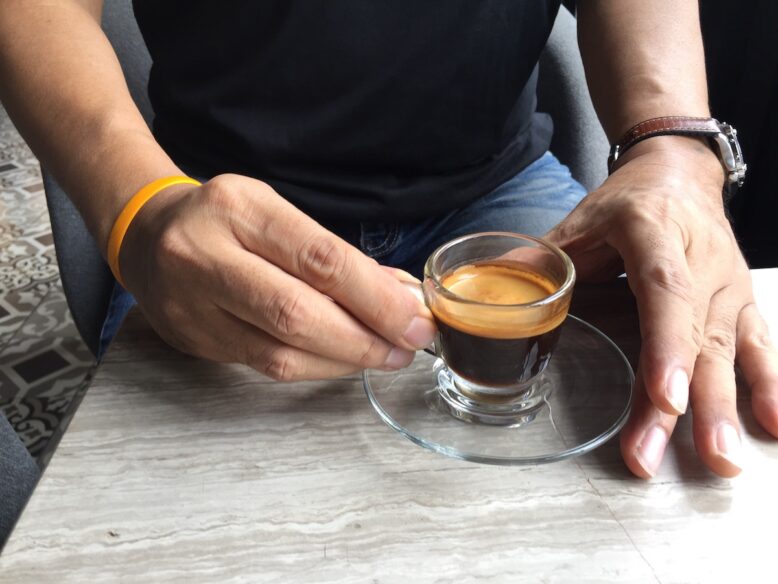From greeting people with cheek kisses to never going out with wet hair, there are many signs that Italian blood courses through your veins. Of course, not every sign applies to every family, but if you can relate to even half of them, you probably grew up in an Italian household, whether in Italy or abroad! In this article, you’ll discover 20 signs that you—and all Italians—may relate to! Let us know how many ring true for you in the comments below.
Dal salutare con baci sulle guance al non uscire mai con i capelli bagnati, sono tanti i segnali che rivelano che nelle tue vene scorre sangue italiano. Ovviamente, non si tratta di leggi universali, ma diciamo che se ti rispecchi in almeno la metà di questi comportamenti, è molto probabile che tu sia cresciuto in una famiglia italiana, sia in Italia che all’estero! In questo articolo esploreremo 20 tratti distintivi degli italiani. Facci sapere nei commenti quanti di questi ti suonano familiari!

This article is part of our Bilingual Blog series, where we share useful information and tips about non-language related aspects of Italian culture such as food, music, travel and more. These articles have been written in Italian and English to give our readers the opportunity to improve their reading skills whilst learning something new about Italy.
You greet people by kissing them on the cheeks
Explanation: Kissing on the cheeks is a form of greeting in Italy. It is common for men to kiss men, women to kiss men, and both men and women to exchange kisses, as long as the setting is informal and a level of familiarity exists between the individuals. Custom dictates two light kisses on each cheek, beginning with the right side and then moving to the left.
Saluti le persone baciandole sulle guance
Spiegazione: Baciarsi sulle guance è il tipico modo di salutarsi in Italia. È normale che uomini bacino uomini, donne bacino uomini, e sia uomini che donne si scambino baci, purché il contesto sia informale e ci sia una certa familiarità. La tradizione prevede due leggeri baci sulle guance, iniziando dalla destra e poi passando alla sinistra.

You speak with hand gestures
Explanation: If you can have a simple conversation with someone using just hand gestures, you know you are Italian to the core. And having lived in Italy for many years as a non-Italian, I can personally attest that the stereotype of gesticulating with your hands is not just a cliché; it is a deeply ingrained cultural trait that is prevalent and, I must say, quite contagious!
Parli gesticolando
Spiegazione: Se riesci a conversare con qualcuno solo con gesti delle mani, allora sei senza dubbio italiano. Dopo aver vissuto in Italia da straniera per molti anni, posso confermare che il gesticolare non è solo un cliché, ma un tratto culturale profondamente radicato e, devo ammettere, anche piuttosto contagioso!

Your last name ends in a vowel
Explanation: So, this is not a strict rule – in fact, two of my Italian family members have last names that end in consonants. However, for the most part, the majority of Italians have last names that end in a vowel, similar to how most words in Italian end in a vowel. Just think of the surnames Rossi, Romano, Bianchi, Esposito… you get a good idea! You can see a list of the most popular Italian last names here.
Il tuo cognome finisce con una vocale
Spiegazione: Anche se non è una regola assoluta – due membri della mia famiglia italiana hanno cognomi che terminano con una consonante – la maggior parte dei cognomi italiani finisce con una vocale, proprio come la maggior parte delle parole. Pensa a cognomi comuni come Rossi, Romano, Bianchi, Esposito! Puoi vedere un elenco dei cognomi italiani più diffusi qui.

You miss your bidet when you’re abroad
Explanation: For those of you who don’t know, a bidet is a low oval basin, located beside the toilet, used for washing one’s parti intime (private parts). In Italy, using the bidet is an essential and integrated part of the toilet routine. Most Italians can’t fathom not having one to thoroughly clean themselves. So, what do Italians do when they travel abroad? They use the shower head, bottles of water, portable bidets or portable wipes!
Ti manca il bidet quando sei all’estero
Spiegazione: Per chi non lo sapesse, il bidet è un lavandino basso e ovale, collocato accanto al water e usato per l’igiene intima. In Italia, il bidet è un elemento essenziale della routine quotidiana per la pulizia personale. La maggior parte degli italiani non riesce nemmeno a immaginare di poter vivere senza. Quindi, cosa fanno gli italiani quando viaggiano all’estero? Ricorrono al doccino oppure usano bottiglie d’acqua, bidet portatili e salviette!

You refuse to go out with wet hair
Explanation: In Italy, there is a widespread belief that sudden temperature changes are detrimental to one’s health. In fact, many Italians tend to attribute their illnesses to il vento (the wind)! Going outside with capelli bagnati (wet hair) is seen as a grave risk, as it may result in the dreaded colpo d’aria – literally a “blast of air.” This phenomenon is believed to cause various discomforts, from a stiff neck to indigestion. So if you want to see an Italian go off the deep end, simply walk straight out the door after having a shower!
Ti rifiuti di uscire con i capelli bagnati
Spiegazione: In Italia, c’è la convinzione che i repentini cambiamenti di temperatura siano nocivi per la salute. Infatti sono in molti ad attribuire i loro malanni al vento! Uscire con i capelli bagnati è considerato rischioso, perché si pensa possa causare il temuto colpo d’aria – la “folata d’aria” ritenuta responsabile di fastidi come torcicollo e indigestione. Quindi, se vuoi vedere un italiano andare in agitazione, prova ad uscire di casa subito dopo aver fatto la doccia!

You can’t help but applaud when an airplane lands
Explanation: Whether you are on an Italian domestic or international flight, you can always expect Italians to erupt in enthusiastic applause upon the plane’s landing. It doesn’t matter if the flight is hours delayed and everyone onboard is feeling miserable, the clapping is inevitable. One can only assume that they are applauding the pilot’s skill in safely transporting them from point A to point B!
Non puoi fare a meno di applaudire quando un aereo atterra
Spiegazione: Che tu stia volando su una rotta nazionale o internazionale, è comune vedere gli italiani applaudire con entusiasmo all’atterraggio. Non importa se il volo è stato ritardato e tutti sono stanchi: gli applausi sono inevitabili. Probabilmente è il loro modo di esprime apprezzamento per l’abilità del pilota nel portare tutti sani e salvi dal punto A al punto B!

You can’t understand why anyone would want a large savoury breakfast
Explanation: In Italy, breakfast (known as colazione in Italian) typically revolves around delectable sweet baked goods, ranging from cookies and brioches to fruit or jam-filled pastries and cereal. It is common to enjoy these delightful treats alongside a milky coffee such as a cappuccino, or a simple espresso. Portions are modest, and breakfast is typically a swift affair. For those accustomed to the hearty breakfasts of bacon, sausages, and eggs in America or England, the Italian breakfast experience may come as quite the shock!
Non capisci come si possa volere una colazione abbondante e salata
Spiegazione: In Italia, la colazione è tipicamente dolce, con tante delizie da forno come biscotti, brioche, e paste ripiene di frutta o marmellata, oltre ai cereali. È comune accompagnare queste prelibatezze con un caffè, che sia un cappuccino o un semplice espresso. Le porzioni sono modeste e la colazione è spesso un pasto veloce. Per chi è abituato a iniziare la giornata con piatti ricchi a base di pancetta, salsicce e uova, come avviene in America o in Inghilterra, la colazione italiana può essere uno shock!

You think breaking or cutting spaghetti is sacrilege
Explanation: Ask an Italian whether cutting or breaking spaghetti is acceptable, and you’ll likely be met with incredulous stares. If your cooking it, gradually ease the spaghetti into the pot, as the boiling water will make it soft. When eating, on the other hand, twirl the fork over a few of the noodles so that you can control your portion.
Pensi che spezzare o tagliare gli spaghetti sia un sacrilegio
Spiegazione: Chiedi a un italiano se è accettabile spezzare o tagliare gli spaghetti e la risposta sarà quasi sicuramente uno sguardo incredulo. Durante la cottura, immergi gradualmente gli spaghetti nella pentola, poiché l’acqua bollente li ammorbidirà. E quando li mangi, arrotolane un po’ intorno alla forchetta per formare la giusta porzione da portare alla bocca.

You eat pasta almost every day
Explanation: Actually, in the case of my husband, you could leave out “almost” if it weren’t for the fact that we order in the occasional Indian takeaway! But seriously speaking, pasta is a staple of Italian food, and most Italian people couldn’t imagine going a couple of days without it. Oh, and it has to be al dente! No one wants to eat pasta that’s troppo cotta (overcooked).
Mangi pasta quasi tutti i giorni
Spiegazione: In realtà, nel caso di mio marito, potremmo tranquillamente omettere il “quasi” se non fosse che ogni tanto ordiniamo cibo indiano! Scherzi a parte, la pasta è un pilastro della cucina italiana e la maggior parte degli italiani non potrebbe immaginare neanche un giorno senza di essa. E deve essere al dente! Nessuno vuole mangiare pasta troppo cotta.

You eat dinner no earlier than 7pm
Explanation: In Italy, as well as in all Mediterranean countries, it’s typical for dinner to commence at 7 p.m. or even later. (Those who dine at 7 p.m. on the dot often have young children!) As you move further south, dinner tends to start even later. Unless you’re in a highly touristy area of Italy, it’s uncommon to find restaurants opening before 7 p.m.
Non ceni mai prima delle 19:00
Spiegazione: In Italia, così come in molti paesi del Mediterraneo, è consueto cenare dopo le 19:00, e talvolta anche più tardi (chi cena alle 19:00 spesso ha bambini piccoli!). Man mano che si scende verso sud, l’orario di cena si ritarda ulteriormente. Pertanto, a meno che non si sia in una zona molto turistica, è raro trovare ristoranti aperti prima delle 19:00.

You have a true sense of fashion
Explanation: During my time in Italy, I became acutely conscious of my appearance and attire. While sweatpants and sneakers might have sufficed back home, I now felt compelled to spend an additional 30 minutes each day carefully selecting my outfit, applying makeup, and styling my hair in order to look as good as the Italians around me. If, for any reason, I chose not to wear makeup, it was not uncommon for my colleagues to comment on it.
Sei davvero stiloso
Spiegazione: Durante il mio soggiorno in Italia, ho iniziato a prestare molta più attenzione al mio aspetto e al mio abbigliamento. Mentre a casa mia potevo tranquillamente vestire tuta e sneakers, in Italia sentivo la necessità di dedicare almeno 30 minuti al giorno a scegliere con cura l’abbigliamento, truccarmi e pettinarmi per non sfigurare rispetto agli italiani intorno a me. E se per qualche motivo decidevo di non truccarmi, non era raro che i miei colleghi facessero commenti a riguardo.

You say “buon appetito” before every meal
Explanation: In many countries, it’s customary to express gratitude for the meal before eating, especially when it has been prepared by someone other than yourself. In France, one says bon appétit, in Japan, itadakimasu, and in Italy, you’ll often hear buon appetito, which translates to “good appetite.”
Dici “buon appetito” prima di ogni pasto
Spiegazione: In molti paesi è abitudine esprimere gratitudine per il cibo prima di iniziare a mangiare, soprattutto se è stato preparato da qualcun altro. Ad esempio, in Francia si dice “bon appétit”, in Giappone “itadakimasu” e in Italia è comune sentire “buon appetito”.

You speak or understand an Italian dialect
Explanation: Italian might be the official language spoken throughout Italy, yet until recently, the majority of Italians conversed in a dialect or minority language as their native tongue. It was only after television was introduced in the late 1950s that standard Italian became prevalent. Although many young Italians today may not be fluent in their parents’ or grandparents’ dialects, they typically grasp and can often use some fundamental words.
Parli o capisci un dialetto italiano
Spiegazione: L’italiano è la lingua ufficiale parlata in tutto il Paese, ma fino a poco tempo fa la maggior parte degli italiani usava principalmente un dialetto o una lingua minoritaria come prima lingua. È stato solo con l’avvento della televisione alla fine degli anni ’50 che l’italiano standard si è diffuso. Oggi, anche se molti giovani italiani potrebbero non essere fluenti nei dialetti dei loro genitori o nonni, solitamente li comprendono e conoscono alcune parole chiave.

You dress in layers
Explanation: In Italy, it is recommended that you “dress like an onion” (vestirsi a cipolla), as you never know what the weather might bring, especially during unpredictable seasons like spring and autumn. Indeed, it’s not unusual to see children bundled up in sweaters and winter coats, even as temperatures begin to climb!
Ti vesti a strati
Spiegazione: In Italia è consigliabile “vestirsi come una cipolla”, perché il tempo è imprevedibile, specialmente in primavera e autunno. Non è raro vedere bambini che indossano maglioni e cappotti invernali anche quando le temperature cominciano a salire!

You are passionate about soccer and your favourite team
Explanation: There’s no denying it – Italians have a strong passion for soccer, much like Americans do for football and hockey. In fact, a survey conducted in 2020 revealed that approximately 6 out of 10 Italians express interest in the sport. Some fans, known as tifosi, are incredibly loyal and will support their team unwaveringly, even if they end up at the bottom of the league standings.
Sei appassionato di calcio e della tua squadra preferita
Spiegazione: Gli italiani hanno una passione travolgente per il calcio, paragonabile all’amore degli americani per il football e l’hockey. Un sondaggio del 2020 ha rivelato che circa che circa 6 italiani su 10 sono interessati a questo sport. Alcuni tifosi, conosciuti come “ultras”, sono particolarmente fedeli alla propria squadra e la sostengono incondizionatamente, anche se dovesse trovarsi all’ultimo posto in classifica.

You chose your vocational path in life early on
Explanation: That’s because in Italy, once you obtain your junior high school diploma at the tender age of 14, you already have to decide what kind of further education you want to pursue. You can either sign up for courses offered by Vocational Training Centers or enroll in a secondary school (vocational institute, technical institute, or high school). And if that weren’t enough, there are actually six different types of high schools (known as liceo in Italian): artistico, classico, linguistico, musicale e coreutico, scientifico, and scienze umane.
Scegli il tuo percorso professionale già in giovane età
Spiegazione: In Italia, all’età di 14 anni, dopo aver conseguito il diploma di scuola media inferiore, si decide che tipo di istruzione superiore si vuole intraprendere. Si può optare per i corsi dei Centri di Formazione Professionale o iscriversi a una scuola superiore che può essere un istituto professionale, tecnico o liceo. Inoltre, ci sono sei tipi di liceo tra cui scegliere: artistico, classico, linguistico, musicale e coreutico, scientifico e delle scienze umane.

You always took your vacations “al mare” or “in montagna”
Explanation: During the summer and winter breaks, Italians flock in their droves to the sandy beaches and towering mountain peaks of the Italian peninsula. Those living near the mountains are often skilled skiers and snowboarders, beginning lessons at a young age. While some may travel abroad, those seeking a quick escape from the hustle and bustle of the big city will typically opt for one of these destinations.
Hai sempre trascorso le vacanze “al mare” o “in montagna”
Spiegazione: Durante le vacanze estive e invernali, gli italiani affollano le spiagge e le vette della penisola. Chi abita vicino alle montagne spesso diventa un abile sciatore o snowboarder, iniziando a prendere lezioni fin da bambino. Anche se alcuni preferiscono viaggiare all’estero, chi cerca una pausa veloce dal caos cittadino sceglie solitamente queste destinazioni.

You are super picky about when and how you drink your coffee
Explanation: Italians are very particular about how they drink their coffee, or caffè in Italian. Cappuccinos are enjoyed before 11 a.m., while the rest of the day is dedicated to espresso, typically consumed quickly while standing at a bar counter or with colleagues around a table at work. Coffee is always enjoyed indoors—never as a takeaway.
Sei molto esigente riguardo a quando e come bevi il tuo caffè
Spiegazione: Gli italiani sono molto attenti a come bevono il caffè. Il cappuccino si beve solo la mattina, fino alle 11. Dopo questo orario, l’espresso diventa il protagonista indiscusso, gustato velocemente al bancone del bar o condiviso tra colleghi attorno a un tavolo di lavoro. Ah, e il caffè si consuma sempre sul posto, mai da asporto.

Your mop up your sauce with bread at the end of a meal
Explanation: The act of mopping up the sauce on one’s plate with a small piece of bread at the end of a meal is known as fare la scarpetta in Italian (literally “to do the little shoe”) and nearly all Italians do it. Note that while it is fine to partake in this ritual during an informal meal, it may be frowned upon during a more formal occasion.
Fai la scarpetta alla fine del pasto
Spiegazione: La scarpetta, quel gesto tipicamente italiano di raccogliere la salsa rimasta nel piatto con un pezzo di pane, è un piacere irrinunciabile. Tuttavia, anche se è perfettamente accettabile in un contesto informale, potrebbe non essere appropriato in occasioni più formali.

Your family comes first
Explanation: This rings true in many cultures, but in Italy, family takes precedence above all else. Even young Italians residing abroad often make multiple trips home each year to ensure they can spend key holidays with their loved ones. Family get-togethers typically include not just immediate family but also extended relatives. And if you find yourself a guest in an Italian household, you’ll be embraced as part of the family, welcomed with open arms as if you were one of their own.
La famiglia viene prima di tutto
Spiegazione: Questo è vero in molte culture, ma in Italia la famiglia ha la precedenza su tutto. Perfino i giovani italiani che vivono all’estero tornano a casa più volte all’anno per celebrare le festività con i propri cari. Le riunioni familiari non coinvolgono solo i parenti stretti, ma anche quelli più lontani. E se sei ospite in una casa italiana, sarai accolto calorosamente, come se fossi parte della famiglia.

Heather Broster is a graduate with honours in linguistics from the University of Western Ontario. She is an aspiring polyglot, proficient in English and Italian, as well as Japanese, Welsh, and French to varying degrees of fluency. Originally from Toronto, Heather has resided in various countries, notably Italy for a period of six years. Her primary focus lies in the fields of language acquisition, education, and bilingual instruction.


